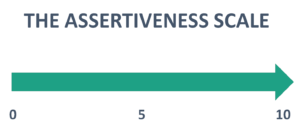Being assertive means being able to express your ideas, opinions, and points of view in a clear and direct way, while still respecting others. Being more assertive can help you improve your relationships by minimizing conflict, and setting boundaries.
Why do we need to be more assertive?
Becoming more assertive will not only lead us to express our point of view in a clear way but will also help us create boundaries for ourselves and hence prevent all the stress that accompanies the fear of confrontation.
However, becoming more assertive is a journey, and as such, it is important to analyze where we are right now, in order to make the changes needed to grow in the direction we want.
If we are not being assertive at the moment, we might be falling into one of these other communication styles
Assertive vs Passive communication
A passive communicator will struggle to express their want and needs. He/she will usually wait for others to express their opinion before agreeing with the majority and will have a lot of trouble saying “No” to other people’s requests.
The problem with this type of communication style is that you will become invisible to others. This will happen because others will expect you to just go along with their ideas and their requests. In turn, this will make you feel frustrated because you are not expressing your opinions and you are not being seen as a valuable member of the team.
Assertive vs. Passive Aggressive Communication
How many times have we encountered passive-aggressive people? This type of communication is clear when someone does not tell you how they really feel, but it is clear that something is bothering them. They never confront people directly, instead, they use indirect strategies like the silent treatment to get what they want
Phrases like: “sure, I can do this for you, it’s not like I have a life on my own”
Or you might see them rolling their eyes, or simply showing you with their body language, that they are not happy about the situation, even though verbally they say the opposite.
Passive aggressive communicators might appear they want to collaborate but secretly sabotage.
The issue with this type of communication style is that nobody will trust a passive-aggressive communicator. If you cannot acknowledge your anger, a sense of powerlessness will build up as well as mounted stress.
Assertiveness vs. Aggressive communication
An aggressive communicator is someone who loses his/her temper with others. They think that their opinion is the best and they raise their voice in order to lower others, as well as use expansive body language to intimidate others.
They try to control others to make them do what they want.
I probably do not even need to tell you what is the problem with this communication style. Who wants to be around an aggressive communicator in the workplace? This will leave this person isolated and there will be resentment in their surroundings
Assertiveness scale

Where do you think you fall on the assertiveness scale? If 0 is not assertive at all, and 10 is very assertive?
Now let me ask you. Do you give yourself the same score in work, family, or friends situations?
One thing that comes back every time I have a coaching session with a client is the fact that they feel more assertive in certain settings than in others. They tell me that they feel really confident standing up for their opinions and beliefs with their siblings, but they are terrified to do the same with colleagues.
This happens more often than not because we have some limiting beliefs that apply in specific social settings. If we grew up in a household where one of the parents was very dominant, it will be more difficult to be assertive, compared to doing it at work with a boss that is open and understanding.
Becoming assertive is a process, it does not happen from one day to another.
How to be more assertive
As mentioned above, becoming assertive is a process, it requires practice and in some cases preparation to know how to react in different situations. But there are some things you can implement immediately that will make a big difference in the way others perceive you.
1. Body language
The first step to being more assertive in your communication is to start with your body language. A closed and hunched posture will not help you feel confident to defend your points. Elongate your posture, open up your arms and look the other person in the eye when you are talking.
2. The I message
One of the biggest mistakes when communicating is to use a lot of “you’s” .
“You” always do that
“you” never help
When the other person hears this, he/she automatically go into defense mode, because they feel attacked.
The power of I, means that we express our opinions and needs from our perspective, and in this way prevent a big confrontation. How do you do it? Start your sentences with “I think”, I feel, in my opinion.
“I” statements allow you to be confident and assertive without alienating others.
3. Be clear and to the point
Many times we want to protect other people’s feelings and sugarcoat our requests. Unfortunately, this is not an efficient way of communicating because it is difficult for the other person to discern what is the message you want to send. This is why is so important to be clear in our communication, for the other person to know exactly what you need.
For example:
Don’t: Sorry to bother you, I know you are busy, but would it be possible to send me that report at your earliest convenience tomorrow, so I can compile all the information and send it to the client?
DO: I need to send the compiled information tomorrow. Can you send me your report by 11 am, please?
4. Keep your emotions in check
This is one of the most difficult things when we are having a difficult conversation. It is normal to feel angry, frustrated, or even like you need to cry. If you are overcome with emotions, wait to have the conversation until you have calmed down and feel like you can keep your composure. Breathe in a normal way and pace yourself when you speak.
5. Learn to say no
Setting boundaries for ourselves is one of the most important things we can do if we want to be more assertive. And learning to say NO is a great starting point. Take the time to reflect and analyze for yourself the things you don’t want to do anymore and the things you want to say NO to.
6. Take small steps
Remember when I asked you to score yourself on the accountability scale? It doesn’t matter where you placed yourself, what matters is to understand that there will not be 180° shifts from one day to another. We cannot expect to go from a 4 to a 10 from one day to another. If you have scored a 4, aim to improve to a 5. Make small changes, practice, and see what can you improve. Once you feel confident you are a 5, aim one step higher and go for a 6. Becoming more assertive is a journey, and it takes practice. Embrace the journey and you will see how your communication becomes more efficient.
Did you enjoy reading this post? There is more interesting content on the blog






[…] Do you need more tips on How to be more Assertive? Check this article […]